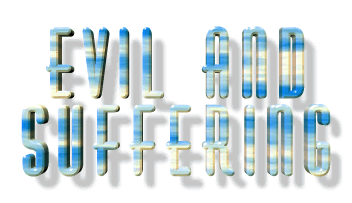

"Look round this universe. What an immense profusion of beings animated and organized, sensible and active! You admire this prodigious variety and fecundity. But inspect a little more narrowly these living existences, the beings worth regarding. How hostile and destructive to each other! How insufficient all of them for their own happiness! How contemptible or odious to the spectator! The whole presents nothing but the idea of a blind nature, impregnated by a great vivifying principle, and pouring forth from her lap, without discernment or parental care, her maimed and abortive children!"The conclusions to be drawn from this problem would seem to be:
Note:
It could be argued that all suffering and moral evil is caused entirely by natural processes and that therefore there is no need to implicate God. But that will not do, for the fact is that God did not intervene to prevent evil from happening (whatever its immediate cause) which (if omnipotent) He might reasonably be expected to do. Also, a God who creates ex nihilo is presumed to be absolutely responsible for creating and sustaining the laws of nature, and with them the limitations that give rise to suffering.
In other words
Even if evil and suffering are simply a lack of perfection, that does not excuse God from choosing to create a world that is less than perfect.
Aquinas (in Summa Theologiae) presents the issue in another rather stark way. His argument starts with the fact that God and evil are incompatible:
Comment
If evil is defined as a lack of goodness, is it not equally the case that goodness is simply a lack of evil? You could argue that, in a world created by a psychopath, where nature forces its way forward only by means of suffering and death, there is a 'problem of goodness'. The clue to unknot this particular problem is that 'good' and 'evil' are not entities (things) but qualitative judgements. There is no such 'thing' as evil, only things which are judged to be evil. Describing the world as fundamentally good or fundamentally evil is a choice that reflects personal values - it doesn't change the facts.
"How, if we had no knowledge of the contrary, could we have had instruction in that which is good?
For just as the tongue receives experience of sweet and bitter by means of tasting, and the eye discriminates between black and white by means of vision, and the ear recognises the distinction of sound by hearing, so also does the mind, receiving through the experience of both the knowledge of what is good, become the more tenacious in its preservation, by acting in obedience to Godů But if any one shun the knowledge of both kinds of things, and the twofold perception of knowledge, he unaware divests himself of the character of a human being."
(Irenaeus Against Heresies iv. xxxix. 1 quoted in Hick p. 220; Fontana, 1968)
"A world without problems, difficulties, perils, and hardships would be morally static. For moral and spiritual growth comes through response to challenges; and in a paradise there would be no challenges,"
"This depravity is itself an evil which is a necessary condition of a greater good. It makes possible a choice made seriously and deliberately, because made in the face of a genuine alternative. I stress that, according to the free will defence, it is the natural possibility of moral evil, which is the necessary condition of the greater good, not the actual evil itself. Whether that occurs is (through God's choice) outside God's control and up to us."
"If the suffering of children go to swell the sufferings which was necessary to pay for truth, then I protest the truth was not worth the price."